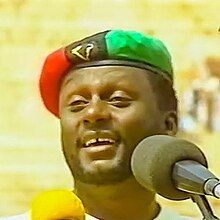Robert Kajuga (Interahamwe)
Robert Kajuga | |
|---|---|
 | |
| Born | Jerry Robert Kajuga 1960 |
| Died | before March 2007 |
| Nationality | Rwandan |
| Allegiance | Rwanda |
| Conviction(s) | Crimes against humanity |
| Criminal penalty | Life imprisonment |
Date apprehended | 1996[citation needed] |
| Imprisoned at | Butare |
Jerry Robert Kajuga (1960[1] – before March 2007) was national president of the Interahamwe,[2] the group largely responsible for perpetrating the Rwandan genocide against the Tutsi people in 1994. Born to a Tutsi father and a Hutu mother, Kajuga concealed his background and presented himself as being of pure Hutu descent
. This is notable as Hutu Power extremist groups considered Hutus who married Tutsis to be race traitors,[3] and Kajuga went to great lengths to conceal his identity.
Biography
[edit]Kajuga was born in Kibungo[4] to a mixed-tribal family: his mother was Hutu and his father was Tutsi but had acquired false Hutu identity papers.[5][6] He was a young brother of Huss Mugwaneza Kajuga, nicknamed "millionaire of Rukara," the boss of SORIMEX-Rwanda, a company that manufactured tooth pastes and palmolive soap. To avoid any kind of suspicion about their family being Tutsi, Robert Kajuga kept his brother hidden at the Hôtel des Mille Collines in Kigali. According to Paul Rusesabagina, who managed the hotel, Kajuga was one of the many infiltrators within the Interahamwe sent by Tutsi rebel leader Paul Kagame.[7]
Kajuga defended his participation in the genocide by arguing that Tutsis were responsible for trying to "take power" and stated "[w]e defended ourselves. Even the eleven-year-old children came with grenades. That’s why there are bodies at the roadblocks."[8]
One source alleges that Kajuga was apprehended in the nearby Democratic Republic of the Congo after the genocide and transferred to Kigali where he was sentenced to life imprisonment and later died in prison.[9] However, his cousin Prosper Ingabire alleged in a ICTR testimony that Kajuga died sometime after the Rwandan Genocide in Kinshasa following a long illness that kept him bedridden throughout the genocide.[10]
References
[edit]- ^ PhD, Alexis Herr (2018). Rwandan Genocide: The Essential Reference Guide. ABC-CLIO. p. 98. ISBN 9781440855610.
- ^ Dallaire, Roméo (2004), Shake hands with the devil : the failure of humanity in Rwanda (1st ed.), Toronto: Vintage Canada, p. 346
- ^ John A. Berry and Carol Pott Berry (eds.) (1999). Genocide in Rwanda: A Collective Memory (Washington, D.C.: Howard University Press) pp. 113–115.
- ^ "Le phénomène «INTERAHAMWE». Anastase Gasana et Robert Kajuga ou l'illustration de la duplicité au Rwanda des années 1990-1994. | LeRwandais". 2 May 2019. Archived from the original on 15 July 2020. Retrieved 15 July 2020.
- ^ Vasagar, Jeevan (16 February 2005). "The hotel that saved hundreds from genocide". The Guardian. London, UK. Archived from the original on 10 January 2023. Retrieved 17 December 2016.
- ^ ""Leave None to Tell the Story": Genocide in Rwanda". Human Rights Watch. 1999. Archived from the original on 10 January 2023.
The militia was directed by a national committee that included Jerry Robert Kajuga, president (himself the son of a Tutsi father and Hutu mother),
- ^ "The Grinding Machine: Terror and Genocide in Rwanda". Toward Freedom. 24 April 2007. Archived from the original on 11 April 2021. Retrieved 3 April 2021.
- ^ "The Rainy Season". Granta. 24 October 2013. Archived from the original on 2 March 2021. Retrieved 3 April 2021.
- ^ Bachmann, Klaus; Fatić, Aleksandar (2015). The UN International Criminal Tribunals: Transition Without Justice?. Routledge. p. 131. ISBN 9781317631361.
- ^ "23.03.07 – ICTR/WEEKLY SUMMARY – ICTR CLEARS A LAWYER ACCUSED OF BRIBING A WITNESS". www.justiceinfo.net. 23 March 2007. Archived from the original on 12 January 2020. Retrieved 12 January 2020.
Robert Kajuga died some time after in Kinshasa following his illness.
